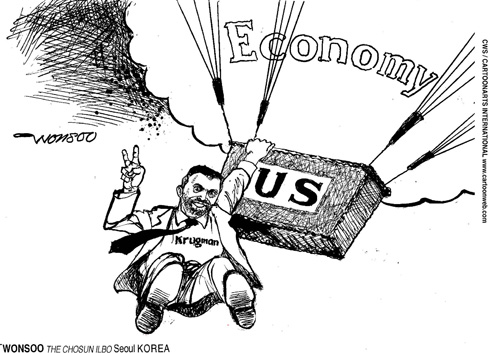It doesn’t upset me when people attack my ideas.
On the contrary, I feel that most wouldn’t bother unless they were worried that I was actually affecting the course of events.
For example, when I was reading Yahoo! Finance not long ago, this essay was featured on the home page: “Krugman is Wrong! Stimulus Spending Is ‘Hurting the Economy,’ Says Brian Wesbury.”
In a video interview, Mr. Wesbury, an economist at the Illinois-based investment-services firm First Trust Portfolios, warns against the evils of government spending: “I say government stimulus destimulates because by moving resources out of one sector into another you’ve now messed up the natural order of things and you’ve influenced it, I think, in a negative way.”
But the interviewers point out that “Paul Krugman is screaming at the top of his lungs,” about the need for stimulus spending.

“The government is not needed to create growth,” Mr. Wesbury tells the interviewers.
I was tempted to ignore these comments, but then I remembered that Mr. Wesbury is someone to be reckoned with.
After all, not many of us had the analytical prowess to declare, in a memo to investors on the day that Lehman Brothers collapsed in 2008, that: “The good news is that this financial earthquake is unlikely to turn into an economic earthquake. The bad loans made earlier this decade did not create a widespread economic boom; and the realization of how bad some of these loans are will not create an economic bust.”
When he says that I am wrong, I am not all that sure you should trust his judgment.
Have I ever made any big mistakes? Yes. Two, I think.
And just to clarify, I’m talking about professional mistakes. (The other kinds of mistakes are none of your business!)
The first was in the mid-1990s, when I dismissed the first reports of a surge in productivity growth in the United States that was linked to the spread of information technology.
I thought I saw faulty logic in the argument, and then I extrapolated and dismissed everything enthusiasts were saying. In fact, the productivity surge was real.
Truthout is supported by our readers. Help keep us independent with a tax-deductible donation.
The second mistake was made circa 2003.
Following the invasion of Iraq, President George W. Bush’s administration relied on the illusion of an easy victory to push through further tax cuts, even though the budget projections used to justify the first round of cuts had already proven far too optimistic.
Pushing permanent tax cuts during a time of war — and pushing them without spending cuts to offset their effects — struck me as banana-republic behavior. (And then they pushed through an unfunded expansion of Medicare as well.)
That strange situation was very different from the United States’ present circumstances, in which I support temporary deficit spending to address the problems of our depressed economy.
I wrongly believed at the time that markets would see things the same way I did; namely, that bond investors would lose faith in American governance, which would drive up interest rates on our debt.
Instead, the bond market was not affected, since investors apparently believed that America would eventually pull itself together and start behaving responsibly.
The jury is still out in some ways, but my prediction clearly proved wrong in the short term.
I learned from both mistakes.
Ever since my flub in the ’90s, I have taken very seriously the observations of people on the ground, even if their positions have not always been well argued.
And I also learned that markets give certain countries a lot of leeway.
So, yes, I have been wrong. Let he without error cast the first stone.
© 2010 The New York Times Company
Truthout has licensed this content. It may not be reproduced by any other source and is not covered by our Creative Commons license.
Paul Krugman joined The New York Times in 1999 as a columnist on the Op-Ed page and continues as a professor of economics and international affairs at Princeton University. He was awarded the Nobel in economic science in 2008.
Mr Krugman is the author or editor of 20 books and more than 200 papers in professional journals and edited volumes, including “The Return of Depression Economics” (2008) and “The Conscience of a Liberal” (2007).
Join us in defending the truth before it’s too late
The future of independent journalism is uncertain, and the consequences of losing it are too grave to ignore. To ensure Truthout remains safe, strong, and free, we need to raise $43,000 in the next 6 days. Every dollar raised goes directly toward the costs of producing news you can trust.
Please give what you can — because by supporting us with a tax-deductible donation, you’re not just preserving a source of news, you’re helping to safeguard what’s left of our democracy.
